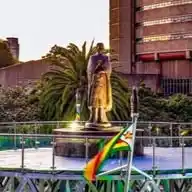
Zim Global Media News
March 1, 2025 at 03:50 PM
_Nations Are Built on Unity and Peace, The Bedrock of Civilization_
By Takasununguka Ziki
FOLLOW OUR CHANNEL:
https://whatsapp.com/channel/0029VaCpLzu2f3EBYPSgI93M
01 March 2025 | Zim Global Media News 🗞️
*WEEKEND BITES* - From the ancient city-states of Mesopotamia to the modern “democracies” of the 21st century, history has proven one universal truth: nations thrive when built on unity and peace.
These twin pillars are not mere ideals but practical necessities for survival, progress, and collective identity.
In an era marked by geopolitical fractures, cultural clashes, and ideological polarization, the urgency to reaffirm these principles has never been greater.
Today, I explore how unity and peace have shaped civilizations, examine contemporary challenges to these ideals, and underscore their irreplaceable role in fostering resilient and progressive societies.
The earliest human settlements evolved into civilizations when disparate groups united under shared goals.
The Indus Valley Civilization (3300–1300 BCE) flourished due to its emphasis on trade cooperation, standardized urban planning, and social harmony.
Similarly, the Roman Empire’s Pax Romana (27 BCE–180 CE) demonstrated how enforced peace across diverse territories enabled economic prosperity and cultural exchange, from Britain to Egypt.
The 20th century saw newly independent nations like India and South Africa grappling with deep divisions.
India’s founding leaders, including Mahatma Gandhi and Jawaharlal Nehru, prioritized secularism and unity in diversity to bind together a population fractured by religion, language, and caste.
Nelson Mandela’s vision of a “Rainbow Nation” in post-apartheid South Africa emphasized reconciliation over retribution, proving that even the most divided societies could heal through intentional unity.
Perhaps the most striking modern example of unity breeding peace is the European Union (EU), hated and hurting as it may be to lesser nations.
Emerging from the ashes of World War II, the EU transformed a continent ravaged by centuries of warfare into a zone of cooperation.
By linking economies and promoting free movement, the bloc turned historical rivals like France and Germany into partners, reducing the likelihood of conflict.
The EU is not a perfect union, but it is a testament to what peacebuilding can achieve.
History is equally littered with cautionary tales.
The Ottoman Empire’s decline was hastened by ethnic and religious divisions among its subjects, while the collapse of Yugoslavia in the 1990s into violent ethnonationalism underscored the dangers of exploiting identity politics.
Division is a weapon—one that can destroy nations faster than any foreign invasion.
Today, nations like the United States, Brazil, and India face internal rifts fueled by misinformation, economic inequality, and partisan extremism.
In the U.S., a 2022 Pew Research study found that 65% of citizens believe political polarization has worsened since 2020, eroding trust in institutions and destabilizing governance.
Similarly, Brazil’s 2023 Capitol riots revealed how deeply division can undermine democracy, injure peace and impede progress.
War and discord exact a devastating human cost. The Syrian Civil War, now in its 13th year, has displaced over 13 million people and destroyed infrastructure critical to education, healthcare, and economic stability.
Meanwhile, ongoing conflicts in regions like Myanmar and Sudan remind us that without unity, societies risk perpetual cycles of violence.
Nations that prioritize inclusive policies tend to foster stronger unity. Canada’s multiculturalism policy, enacted in 1971, celebrates diversity while promoting a shared national identity.
Education systems that teach empathy, critical thinking, and shared history can bridge divides.
In post-war Germany, schools focused on Holocaust education to ensure younger generations understood the consequences of hatred.
Singapore’s “National Education” curriculum emphasizes racial harmony and civic responsibility, key to maintaining peace in its multiethnic society.
Citizen-led initiatives often drive lasting impact. In Colombia, community peace councils helped implement the 2016 FARC peace deal at the local level. South Korea’s Candlelight Revolution of 2016–2017, which ousted a corrupt president, showed how peaceful mass mobilization can renew democratic unity.
Economic disparity is a potent driver of division. Nations like Norway and Denmark mitigate this through robust social safety nets and progressive taxation, fostering trust in institutions.
Organizations like the United Nations (UN), African Union (AU), SADC and ASEAN among others play pivotal roles in mediating conflicts and promoting cooperation.
The UN’s Sustainable Development Goals (SDGs), particularly Goal 16 (“Peace, Justice, and Strong Institutions”), provide a framework for nations to address inequality and governance.
However, critics argue that such bodies must evolve to address modern challenges like cyber warfare and climate-induced migration.
“Global peace is not the absence of conflict,” says UN Secretary-General António Guterres, “but the presence of dialogue, justice, and shared responsibility.”
Technology has reshaped how nations pursue—or undermine—unity.
Social media can amplify division through echo chambers and disinformation, as seen in Myanmar’s Rohingya crisis.
Governments and tech firms now face urgent calls to balance free speech with accountability.
Nations are not passive entities; they are constructed through conscious choices.
The rise of autocrats and populists exploiting division reminds us that these ideals are fragile.
As climate change, AI, and geopolitical shifts redefine the 21st century, the need for cohesive societies is more pressing than ever.
In the words of Martin Luther King Jr., “We must learn to live together as brothers or perish together as fools.”
The path forward is clear: nations built on unity and peace are not just aspirational—they are essential.
———————————————
Zim Global Media News 🗞️
an Afrocentric Voice
https://www.zimglobalmedia.co.zw
———————————————